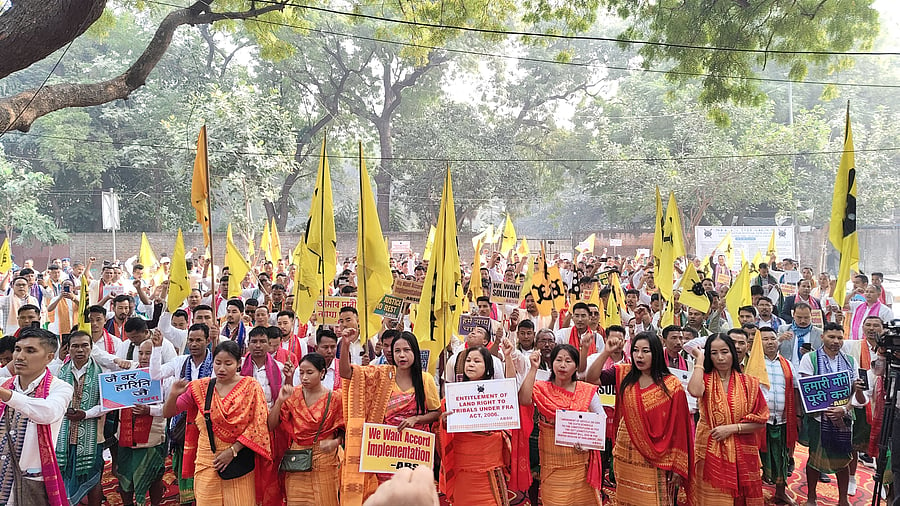
Protesters at Jantar Mantar in New Delhi on Friday (November 21).
Credit: ABSU
Guwahati: Since the 2021 elections, the ruling BJP and its allies in Assam have repeatedly showcased the 2020 Bodoland Accord as a major achievement. “By signing the Bodoland Accord in 2020, we ended violence in Bodoland,” Home Minister Amit Shah had said on several occasions after the signing of the Accord in New Delhi in January 2020.
The Accord did help restore peace in Bodoland, a region that had witnessed large-scale violence since the 1980s, reportedly resulting in more than 4,000 deaths and widespread destruction. The Bodoland region, comprising five districts in western and northern Assam — Kokrajhar, Baska, Chirang, Udalguri and Tamulpur — with a population of over 31 lakh, has witnessed no major violence since 2020, after members of all four factions of the National Democratic Front of Bodoland (NDFB) laid down arms and joined the mainstream.
The Accord promised a special package of Rs 1,500 crore over three years for the development of Bodoland, particularly the Bodo community, Assam’s largest plains tribal group.
Many members of the All Bodo Students’ Union (ABSU) and NDFB, key signatories to the Accord, joined the United People’s Party Liberal (UPPL). The party won the 2021 Bodoland Territorial Council (BTC) elections and formed the Council with the BJP as an ally.
UPPL candidates also won seven of the 12 Bodoland Assembly seats in 2021, and the party secured its first Lok Sabha MP (Joyanta Basumatary) from Kokrajhar in 2024. The BJP backed the UPPL’s Rwngwra Narzary for the Rajya Sabha as well.
Cut to the 2025 BTC elections: the political landscape shifted dramatically. The BJP not only contested the polls on its own but also re-inducted the Bodoland People’s Front (BPF) — UPPL’s main rival — into the NDA and the state government after the BPF stormed back to power in the BTC, winning 28 of 40 seats. BPF’s return has unsettled the UPPL, although the UPPL remains part of the NDA and the Assam government.
Unresolved issues
The change of guard has strained BJP–UPPL relations and raised questions about the future of the 2020 Bodoland Accord. Concerns deepened when the new BTC chief, BPF president Hagrama Mohilary, said his party was committed only to the 2003 Bodoland Accord.
“It is up to them to implement the 2020 Accord,” said Mohilary, who headed the now-disbanded Bodo Liberation Tigers (BLT) before the 2003 Accord.
Discontent spilt onto the streets on November 20 and 21, when members of ABSU, the Ex-NDFB Welfare Association, and the United Bodo People’s Organisation — signatories to the 2020 Accord — held demonstrations at Jantar Mantar in New Delhi, blaming the Centre for failing to implement key commitments.
Some major unresolved clauses include the inability to pass the 125th Constitution Amendment Bill, 2019, to enhance the powers of BTC-like autonomous councils; direct funding; increasing BTC constituencies from 40 to 60; granting land rights to tribal communities under the Forest Rights Act; and withdrawal of cases against former NDFB members.
Work completed so far includes strengthening Bodoland University, forming the Bodo-Kachari Welfare Autonomous Council, and including 81 villages from Sonitpur and Biswanath districts within the BTC.
Blame on the Centre and state
Sources within the UPPL claim that only about half of the special package promised in the Accord has been released. The Council, headed by Pramod Boro, former ABSU president, says it struggled to deliver on its commitments primarily because funds were not released. Some Central funds for the BTC are routed through the state government.
UPPL general secretary Raju Kumar Narzary told DH: “Any deviation from the commitments may trigger a sense of betrayal and could lead to a return of unrest in Bodoland. The government must implement the Accord with full sincerity.”
Asked why the Accord remains only partly implemented despite the UPPL–BJP alliance being in power for nearly five years, Narzary said: “There is a lack of political will on the part of both the Union and state governments.”
The ABSU said the government had committed to implementing the Bodo Accord before 2026. Despite more than 12 tripartite review meetings between ABSU, other signatory organisations, the Government of India, and the Government of Assam, at least six key commitments remain unimplemented.
Meanwhile, it remains unclear whether the UPPL will contest the 2026 Assembly elections with the BJP or independently. Both parties will face opposition questions about why the Bodoland Accord has remained unimplemented over the past five years despite tall claims by the Centre and the state.
ABSU and other groups have demanded time-bound implementation of the 2020 Accord to prevent any recurrence of unrest in Bodoland.